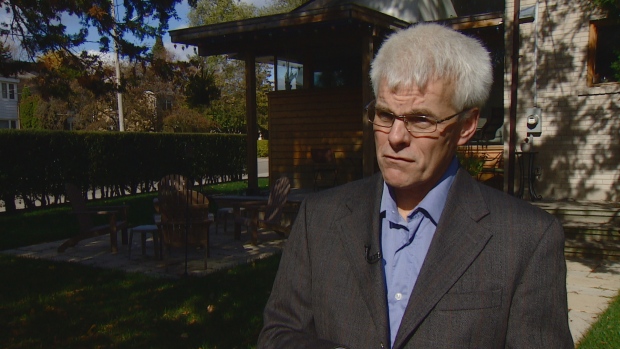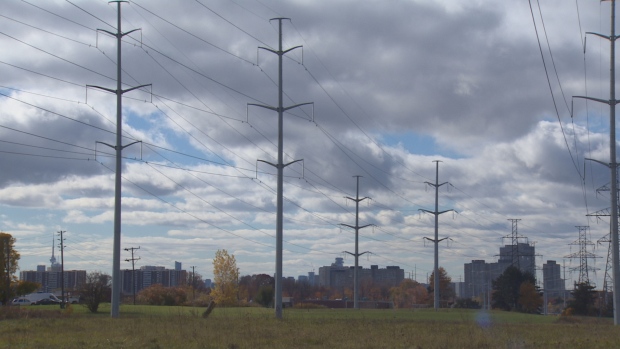Electricity prices in Ontario officially increased Sunday and the rate hike is expected to push up the average household hydro bill by 3.4 per cent.
- 8 ways to reduce your hydro bill
- Hydro One shares go on sale next week at $20.50
- Ontario electricity rates going up summer 2015
The Ontario Energy Board (OEB) announced the rate increase on Oct. 15 for winter months, which will impact most households and small businesses. Effective Sunday:
- The price for off-peak hours goes up 0.3 cents to 8.3 cents/kWh.
- The price for mid-peak hours goes up 0.6 cents to 12.8 cents/kWh.
- The price for on-peak hours goes up 1.4 cents to 17.5 cents/kWh.
Sunday's rate hike means the on-peak price of electricity has jumped 77 per cent since Smart Meters became common five years ago. In November 2010, the price was 9.9 cents/kWh.
In 2010, the average monthly bill was about $100 per month. The typical household will shell out roughly $31 more per month this year.
In addition to the rate hike, the hours for mid-peak and on-peak prices also change to winter "time-of-use" hours. From Nov. 1 to April 30, weekdays between 11 a.m. and 5 p.m. are considered mid-peak hours. Weekdays between 7 a.m. and 11 a.m. and from 5 p.m. to 7 p.m. are on-peak hours, which saw the highest rate increase.
The OEB said several factors are driving the price hike, including increased costs related to Ontario Power Generation's nuclear and hydro-electric power plants, as well as costs from renewable sources, such as wind and solar.

Energy consultant Tom Adams says rate-payers are not happy with the upward trend in Ontario's electricity rates. (CBC)
Rate-payers 'angry,' confused
Energy consultant Tom Adams said he hears two things from consumers about the ongoing upward trend in hydro rates.
"Just confusion — What the heck is going on?" Adams told CBC Queen's Park reporter Mike Crawley of the reaction.
"And anger, just people increasingly angry."
Consumers won't get any happier in the new year, either. Their bills will go up again on Jan. 1, when the 10 per cent discount known as the Clean Energy Benefit will end.
Further rate hikes are also expected in the coming years. The provincial government forecasts that hydro bills will hit more than $190 per month in a little more than six years.
"None of it shows any decreases in prices," Adams said. "It only moves in one direction."
Garry Jodoin was one of a handful of residents who went to Energy Minister Bob Chiarelli's office in Ottawa to voice displeasure with the rate hikes.
"A lot of people just can't afford it who are on fixed incomes, pension, etc. And we know this, and that's why I'm out here to complain about it because I'm a senior myself," Jodoin said.
Hydro One sale will 'have an impact'
Michael Shabatowski is another senior citizen who said he has seen his hydro bill triple during his 20-plus years living with his wife in Orleans, Ont.
"I mean, when you're on pension and disability, you watch every penny," the 82-year-old said. "It's not only the hydro ... your food, everything [has] gone crazy."
The higher cost of hydro means some households will be going through an adjustment period in how they manage their finances.
"We have to kind of scrounge a wee bit more. Thank God she's still working until the end of the year," Shabatowski said of his wife. "And after that, it'll be a different story."
Another factor that could affect household hydro bills is the looming sell-off of Hydro One. The Liberal government says partial privatization won't impact consumers' costs, but the opposition thinks otherwise.
"Hydro One will be on its own and the pressure it feels will be from stockholders, people who want increased revenue every year," NDP energy critic Peter Tabuns told CBC News. "That's going to have an impact."
Hydro One shares go on sale Thursday. The province is initially putting 81.1 million shares, or about 15 per cent of the company, up for sale, but could ultimately reduce its stake to about 40 per cent over the next several years.
To encourage thoughtful and respectful conversations, first and last names will appear with each submission to CBC/Radio-Canada's online communities (except in children and youth-oriented communities). Pseudonyms will no longer be permitted.
By submitting a comment, you accept that CBC has the right to reproduce and publish that comment in whole or in part, in any manner CBC chooses. Please note that CBC does not endorse the opinions expressed in comments. Comments on this story are moderated according to our Submission Guidelines. Comments are welcome while open. We reserve the right to close comments at any time.
Note: The CBC does not necessarily endorse any of the views posted. By submitting your comments, you acknowledge that CBC has the right to reproduce, broadcast and publicize those comments or any part thereof in any manner whatsoever. Please note that comments are moderated and published according to our submission guidelines.




























Commenting is now closed for this story.